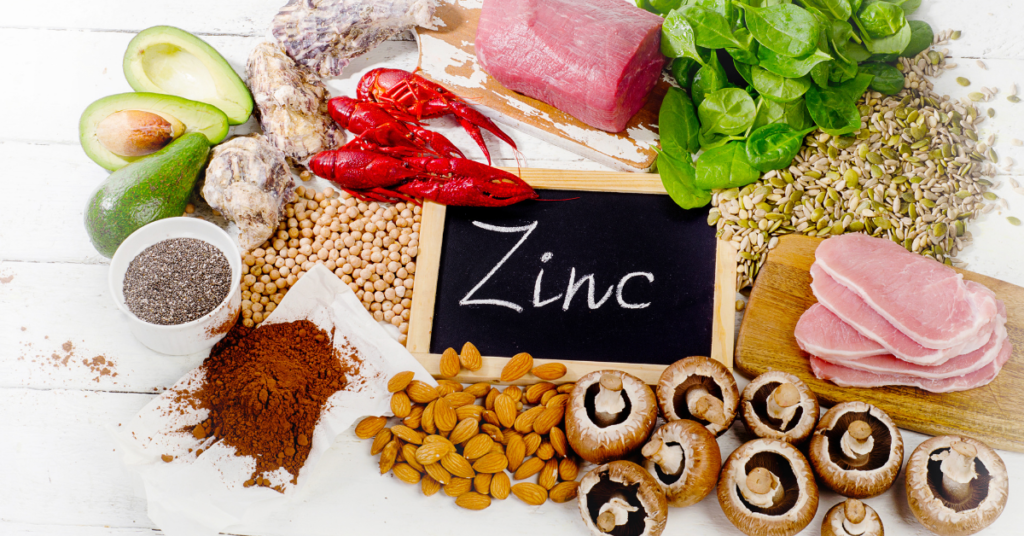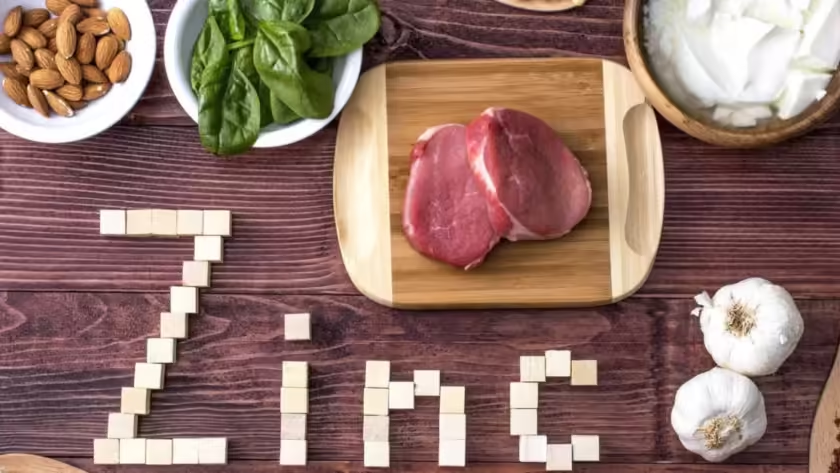Table of Contents
Brief The Article:
Zinc Deficiency
- Most common micronutrient deficiency in crops and human nutrition
- Can cause retarded growth in children
- Estimated 1/3 of the world population is at risk
- 5th most important risk factor for disease in developing countries
Zinc Deficiency Symptoms
- Growth retardation
- Loss of taste and/or smell
- Lowered immune system
- Prostate/testosterone issues
- Skin problems
- Major depression
- Insulin production issues
- Diarrhea
- Eye problems and delayed healing
- Ulcers (mouth and digestive system)
- Age-related macular degeneration
- Inflammation
Sources of Zinc
- Oysters
- Beef
- Crab
- Pumpkin seeds
Factors Affecting Zinc Absorption
- Gastric bypass surgery
- Digestive issues (IBS, Crohn’s, diverticulitis)
- Excessive antibiotic use
- Liver disease, cirrhosis
- Low stomach acid
- Phytates in whole grains and legumes
- Diabetes and high blood sugar
- High carb diets
- GMO foods (glyphosate binds and blocks zinc)
- Depleted soil
Concerns about Zinc
- Limited zinc reserves (approximately 21 years at current mining rates)
- Widespread soil deficiency, especially in Asia
- Glyphosate in GMO foods interferes with zinc absorption
Key Points about Zinc
- Zinc is an essential trace mineral not stored in the body
- Two billion people worldwide are deficient in zinc
- It’s a cofactor for over 1000 enzymes and crucial for DNA/RNA processes
- 10% of all human protein is bound to zinc
Let’s dive into a fascinating topic that’s crucial for your hair health: Zinc! This amazing mineral plays a vital role in keeping your locks luscious and strong, but many people are unknowingly suffering from Zinc Deficiency .
In this article, we’ll explore the main function of zinc for your hair, uncover the telltale signs of Zinc Deficiency Symptoms, and discover how you can ensure you’re getting enough of this essential nutrient. Get ready to unlock the secrets to vibrant, healthy hair with the power of zinc! Let’s get started!
So let’s dive into the details…
The Importance of Zinc for body

Hey guys, today we’re gonna talk about a very fascinating interesting topic, zinc. Now because zinc is so vital for your body and it’s just a fascinating mineral, I created three parts. First thing you need to know is two billion people on this planet are deficient in zinc. That’s crazy. That’s a lot of people that are deficient.
I would imagine it’s even more than that as far as having a subclinical deficiency and as we go through this you’ll see what I’m talking about. One thing about zinc is the body does not store it so you have to constantly actually take it in. and it’s a trace mineral which means that we need it in smaller amounts compared to things like potassium and it’s essential.
Key Points about Zinc:
- Two billion people are deficient in zinc
- The body doesn’t store zinc, requiring constant intake
- Zinc is a trace mineral needed in smaller amounts
- It’s an essential nutrient for the body
Zinc Deficiency and Its Impact
So what does it mainly do? It acts as a cofactor for over 1000 enzymes. So you have all these chemical reactions going on at the cellular level with DNA turning into RNA
which is the kind of the blueprints turning into the copy of those blueprints and the transcription and the interpretation and all that and the building of proteins all needs zinc.
So the enzymes are those things in the body that do all the work and they need certain minerals to accomplish their job. 10% of all human protein is bound to zinc. It’s a vital, vital nutrient. It’s the most common deficiency in crops so I wanna read something here.
Zinc’s Role in the Body:
- Cofactor for over 1000 enzymes
- Essential for DNA and RNA processes
- Crucial for protein building
- 10% of all human protein is bound to zinc
Zinc Deficiency in Agriculture and Human Health

Scarcity in the soil, deficiency of micronutrients that are essential for plant growth, can lead to a lower crop yield. During the past decade soil micronutrient deficiencies have been ascertained primarily for zinc. To a lesser extent, boron and molybdenum.
Soil deficiencies of zinc are widespread in Asia. Scarcity in feed and food and human nutrition, zinc deficiency is the most well known micronutrient deficiency.
Zinc deficiency can cause disorders in humans such as retarded growth in children. We talked about it estimated of 1/3 of the population is at risk for zinc deficiency.
It is the fifth most important risk factor for disease in developing countries. Scarcity of mineral deficiencies of micronutrients in agricultural soils can be replenished with mined minerals.
| Issue | Impact |
|---|---|
| Soil Zinc Deficiency | Lower crop yield, widespread in Asia |
| Human Zinc Deficiency | Retarded growth in children, 1/3 of population at risk |
| Global Health Impact | 5th most important risk factor for disease in developing countries |
Zinc Reserves and Future Concerns
And then they talk about a lot of these minerals are used exclusively for industrial applications, not crops, livestock or for humans. The mineral reserves in relation to the use seem to be most restricted for zinc.
At the current level of production of mining, we have a reserve for approximately another 21 years. So at that point I don’t know what’s gonna happen.
Priorities should be given to zinc because zinc deficiencies are already occurring in food chains in a large part of the world.
Now on top of that, glyphosate as in GMO foods, Roundup Ready, acts as a major chelator to bind and block zinc and other minerals.
Now I couldn’t find the data currently, but in 2007 they were putting 80,000 metric tons of glyphosate into the environment. Don’t worry, it gets worse.
Concerns about Zinc:
- Limited zinc reserves (approximately 21 years at current mining rates)
- Glyphosate in GMO foods binds and blocks zinc absorption
- In 2007, 80,000 metric tons of glyphosate were released into the environment
Symptoms of Zinc Deficiency
Alright so now let’s get into the symptoms of what happens when you’re zinc deficient. Growth retardation.

So if you’re pregnant, if you’re breastfeeding, make sure that you’re taking the trace minerals including zinc to maximize growth of that child. Loss of taste and/or smell.
A lowered immune system which we’ll get into in the next topics. Prostate/testosterone issues. Skin problems, major depression.
Zinc is intimately involved in insulin production. Another side effect of zinc deficiency is diarrhea. Eye problems, delayed healing, ulcers of the mouth, of the digestive system.
Zinc is a really good remedy for ulcers of the stomach as well. Macular degeneration related to age, inflammation in general.
Zinc is a natural anti-inflammatory and it’s a very powerful antioxidant as well and I’m going to talk about some of these other things in more detail in the next couple of topicss.
Symptoms of Zinc Deficiency:
- Growth retardation
- Loss of taste and/or smell
- Lowered immune system
- Prostate/testosterone issues
- Skin problems
- Major depression
- Insulin production issues
- Diarrhea
- Eye problems
- Delayed healing
- Ulcers (mouth and digestive system)
- Age-related macular degeneration
- Inflammation
Sources of Zinc and Factors Affecting Absorption

The foods that are highest in zinc are oysters, beef, crab and pumpkin seeds by the way. Now there’s other things that will decrease your absorption of zinc. If you had a gastric bypass surgery, if you had any type of digestive damage like IBS, Crohn’s, diverticulitis, you’ve had a lot of antibiotics. That can create a problem.
Liver disease, cirrhosis, things like that. And also if you have lower stomach acid. So many people don’t have enough stomach acid because you need this acid to absorb these minerals.
How do you know if you’re deficient? Well if you have heartburn, chances are you’re deficient in the acid that you need to absorb the minerals and especially if you’re taking an antiacid.
| High Zinc Foods | Factors Decreasing Zinc Absorption |
|---|---|
| Oysters | Gastric bypass surgery |
| Beef | Digestive damage (IBS, Crohn’s, diverticulitis) |
| Crab | Excessive antibiotic use |
| Pumpkin seeds | Liver disease, cirrhosis |
| Low stomach acid |
Other Factors Affecting Zinc Absorption
Phytates or phytic acid, that would be in grains, whole grains. It’s in the bran or the fiber of whole grains and legumes. And this compound actually blocks the absorption of zinc.
So it’s actually kinda like a chelator. It binds it very similar to glyphosate. Diabetes. Having high blood sugar because a high carb diet will deplete zinc as well.
So we’re living in this environment that it’s making it very hard to get zinc with the GMO foods, the high carb diets, with the soil becoming depleted,
and with all the pre-existing digestive problems that we normally have, not to mention low stomach acids because I really wanted to bring up your awareness of these connections between these problems and a simple trace mineral.
Additional Factors Affecting Zinc Absorption:
- Phytates or phytic acid in whole grains and legumes
- Diabetes and high blood sugar
- High carb diets
- GMO foods
- Depleted soil
- Pre-existing digestive problems
- Low stomach acid
Alright let’s go to part two. So if you’re enjoying this content, go ahead and share it with someone that could really benefit from it.
Summary
2 billion people are deficient in zinc. The body doesn’t store zinc so you need to constantly take it in and it is also a trace mineral which means it is needed to be taken in smaller amounts.
Main Function of Zinc
- Enzymes are those things in the body that does all the work and zinc acts a cofactor for over 1000 enzymes.
- 10% of all human protein is bound to zinc.
- Natural anti-inflammatory and a very powerful antioxidant.
Glyphosate and GMO foods act as a major chelator to bind and block zinc and other minerals. Every year there are 800,000 people die from having a zinc deficiency.
- Growth Retardation
- Loss of Taste / Smell
- Lowered Immune System
- Prostate / Testosterone Problems
- Skin Problems
- Depression
- Insulin Production
- Diarrhea
- Eye Problem
- Delayed Healing
- Ulcers (Mouth, Digestive Systems)
- Macular Degeneration
- Inflammation
- Bad Breath
Foods High in Zinc
- Oysters
- Beef
- Crab
- Pumpkin Seeds
Things that Decreases Absorption of Zinc
- Gastric Bypass Surgery
- IBS
- Antibiotics
- Liver Disease
- Low Stomach Acid
- Phytates
- Diabetes
- GMO foods
Additional Resources:
FAQ
What is the function and deficiency symptoms of zinc?
Zinc is an essential mineral that plays crucial roles in various bodily functions. Its main functions include:
- Supporting immune system function
- Aiding in protein synthesis
- Promoting wound healing
- Supporting DNA synthesis
- Assisting in cell division and growth
Deficiency symptoms may include:
- Weakened immune system
- Slow wound healing
- Loss of taste or smell
- Hair loss
- Skin problems
- Decreased appetite
What are zinc’s major functions?
Zinc’s major functions in the body include:
- Enzyme function: Zinc is a component of over 300 enzymes in the body
- Immune support: It helps in the development and function of immune cells
- Protein synthesis: Essential for building and repairing tissues
- DNA synthesis: Crucial for cell division and growth
- Wound healing: Supports the repair of damaged tissues
- Antioxidant activity: Helps protect cells from oxidative stress
- Hormone regulation: Influences the production and function of various hormones
Which of the following is a symptom of zinc deficiency?
Common symptoms of zinc deficiency include:
- Impaired immune function (increased susceptibility to infections)
- Delayed wound healing
- Loss of taste (hypogeusia) or smell
- Hair loss
- Skin lesions or rashes
- Diarrhea
- Loss of appetite
- Growth retardation in children
Which disease is caused by deficiency of zinc?
While zinc deficiency itself is not a disease, it can contribute to or exacerbate various health conditions. Some conditions associated with zinc deficiency include:
- Acrodermatitis enteropathica (a rare genetic disorder affecting zinc absorption)
- Impaired immune function leading to increased infections
- Growth retardation in children
- Delayed sexual maturation
- Hypogonadism in males
- Skin disorders like eczema or psoriasis
- Night blindness (when combined with vitamin A deficiency)
Signs of zinc deficiency in females
Zinc deficiency signs in females may include:
- Irregular menstrual cycles
- Hormonal imbalances
- Hair loss or thinning
- Brittle nails
- Acne or other skin problems
- Decreased fertility
- Weakened immune system
- Slow wound healing
- Loss of taste or smell
Zinc deficiency symptoms skin
Skin-related symptoms of zinc deficiency may include:
- Rough, dry skin
- Slow wound healing
- Skin lesions or rashes
- Acne or worsening of existing acne
- Eczema or psoriasis flare-ups
- Cracked or peeling skin, especially around the mouth, eyes, or hands
- Increased susceptibility to sunburn
Zinc deficiency neurological symptoms
Neurological symptoms associated with zinc deficiency may include:
- Cognitive impairment or difficulty concentrating
- Memory problems
- Mood changes, including depression or irritability
- Loss of taste (hypogeusia) or smell
- Peripheral neuropathy (numbness or tingling in extremities)
- Ataxia (lack of muscle control or coordination)
- Seizures (in severe cases)
Symptoms of zinc deficiency in males
Zinc deficiency symptoms specific to males may include:
- Low testosterone levels
- Erectile dysfunction
- Decreased sperm count or quality
- Prostate problems
- Muscle loss or weakness
- Delayed sexual maturation in adolescents
- Hair loss or thinning
- Impaired wound healing
Zinc deficiency diseases
While zinc deficiency itself is not a disease, it can contribute to or exacerbate various health conditions, including:
- Acrodermatitis enteropathica
- Growth retardation
- Impaired immune function leading to recurrent infections
- Hypogonadism
- Delayed wound healing
- Cognitive impairment
- Age-related macular degeneration (AMD)
- Certain types of anemia
Treatment of zinc deficiency
Treatment for zinc deficiency typically involves:
- Oral zinc supplementation (dosage determined by a healthcare professional)
- Dietary changes to include more zinc-rich foods
- Addressing underlying causes of deficiency (e.g., malabsorption disorders)
- Regular monitoring of zinc levels
- In severe cases, intravenous zinc supplementation may be necessary
Zinc deficiency symptoms in child
Zinc deficiency symptoms in children may include:
- Stunted growth or failure to thrive
- Delayed sexual maturation
- Impaired cognitive development
- Weakened immune system (frequent infections)
- Poor appetite
- Diarrhea
- Skin rashes or lesions
- Hair loss
- Behavioral changes or irritability
Zinc deficiency face
Facial symptoms of zinc deficiency may include:
- Acne or worsening of existing acne
- Dry, flaky skin, especially around the mouth and eyes
- Pale or sallow complexion
- Angular cheilitis (cracks at the corners of the mouth)
- Hair loss, including eyebrows and eyelashes
- Dark circles under the eyes
- Delayed wound healing on the face




